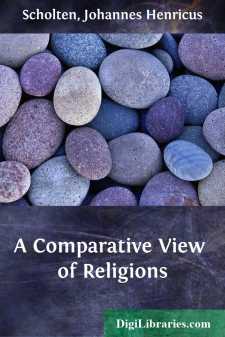Categories
- Antiques & Collectibles 13
- Architecture 36
- Art 48
- Bibles 22
- Biography & Autobiography 813
- Body, Mind & Spirit 142
- Business & Economics 28
- Children's Books 17
- Children's Fiction 14
- Computers 4
- Cooking 94
- Crafts & Hobbies 4
- Drama 346
- Education 46
- Family & Relationships 57
- Fiction 11829
- Games 19
- Gardening 17
- Health & Fitness 34
- History 1377
- House & Home 1
- Humor 147
- Juvenile Fiction 1873
- Juvenile Nonfiction 202
- Language Arts & Disciplines 88
- Law 16
- Literary Collections 686
- Literary Criticism 179
- Mathematics 13
- Medical 41
- Music 40
- Nature 179
- Non-Classifiable 1768
- Performing Arts 7
- Periodicals 1453
- Philosophy 64
- Photography 2
- Poetry 896
- Political Science 203
- Psychology 42
- Reference 154
- Religion 513
- Science 126
- Self-Help 84
- Social Science 81
- Sports & Recreation 34
- Study Aids 3
- Technology & Engineering 59
- Transportation 23
- Travel 463
- True Crime 29
A Comparative View of Religions
Description:
Excerpt
CHAPTER I.
FETICHISM. THE CHINESE. THE EGYPTIANS.
1. FETICHISM.
The lowest stage of religious development is fetichism, as it is found among the savage tribes of the polar regions, and in Africa, America, and Australia. In this stage, man's needs are as yet very limited and exclusively confined to the material world. Still too little developed intellectually to worship the divine in nature and her powers, he thinks he sees the divinity which he seeks in every unknown object which strikes his senses, or which his imagination calls up. In this stage, religion has no higher character than that of caprice and of love of the mysterious and marvelous, mixed with fear and a slavish adoration of the divine. The worship and the priest's office (Shaman, Shamanism) consist here chiefly in the use of charms, to exorcise a dreaded power. From this savage fetichism the nature-worship found among the Aztecs in Mexico, and the worship of the sun in Peru, are distinguished by the greater definiteness and order of their religious conceptions and usages. In them the gods have names, and an ordained priesthood cares for the religious interests of the people. The highest form to which fetichism has attained is the worship of Manitou, the great spirit, which is found among the ancient tribes of North America.
2. THE CHINESE.
When man reaches a higher development, caprice and chance disappear from religion. Having outgrown fetichism, man begins, as is the case among the Chinese, to distinguish in the world around him an active and a passive principle, force and matter (Yang and Yn), heaven and earth (Kien and Kouen). We have here nature-worship in its beginnings. In this stage, even less than in fetichism, is there a definite idea of God, much less a conception of him as personal and spiritual lord. The Chinese, from the practical, empirical point of view peculiar to him, recognizes the spiritual only in man and chiefly in the state. His religion, therefore, is confined exclusively to the faithful keeping of the laws of the state (the Celestial Kingdom), in which he sees the reflection of heaven, to the recognition of the Emperor as the son and representative of heaven, and to the worship of the forefathers, especially of the great men and departed emperors, to whose memory the Chinese temples, or pagodas, are dedicated. The origin of this religion dates, according to the tradition, from Fo-hi (2950 B.C.), the founder of the Chinese state. In the fifth century before Christ, Kong-tse, or Kong-fu-tse (Confucius), appeared as a reformer of the religion of his countrymen, and gathered the ancient records and traditions of his people into a sacred literature, which is known by the name of the "King" (the books), "Yo-King" (the book of nature), "Chu-King" (the book of history), "Chi-King" (the book of songs). The contents of the "King" became later with the Chinese sages Meng-tse (360 B.C.) and Tschu-tsche (1200 A.D.) an object of philosophical speculation. The doctrine of Lao-tse, the younger contemporary of Kong-tse, which lays down as the basis of the world, that is of the unreal or non-existent, a supreme principle, Tao, or Being, corresponds with the Brahma doctrine of the Indians, among whom he lived for a long time; but this doctrine never became popular in China....












